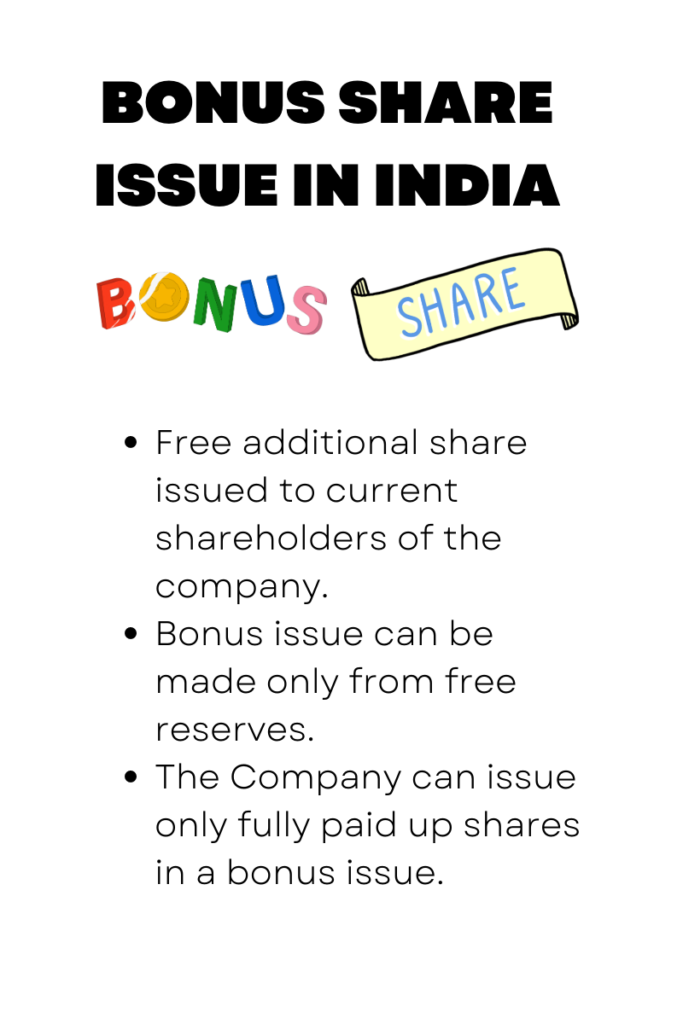Table of Contents
Meaning of a Bonus Share
A bonus share is a free additional share given to the current shareholders of the company. The shares are given in proportion to the number of shares already held by the investor. A company may issue bonus shares when it has a liquidity crunch and is unable to pay cash dividends or when it wants to convert its reserves into share capital. Bonus share issue does not impact cash flow. It increases the share capital by reducing reserves and has no impact on the net assets of the company. A bonus issue impacts earnings per share as the number of shares increase.
Understanding Bonus Shares
Let’s understand this concept with an example. Hari owns 100 shares of ‘John Black Ltd’ which he bought at Rs 800 per share. The total invested amount is Rs 80,000. The company issues bonus shares in the ratio of 5:1. This means 5 bonus shares for every 1 share held. Now, Hari gets 500 bonus shares which are calculated as [5*100/1]. So Hari’s total holding after bonus issue is: 500 bonus shares + 100 shares owned previously = 600 shares. The total invested amount still remains Rs 80,000. The price per share for Hari changes to Rs 133 [80,000/600].
Like in the above example, when a company issues bonus shares, the number of shares increases. However the amount of share capital remains the same. As a result the per share market price decreases immediately after a bonus issue.
Eligibility to issue Bonus Share
When a bonus issue is announced, the company also announces the record date. The Record date is the date when the bonus issue will take place. All those who are shareholders of the company on the record date are eligible to receive bonus shares.
It is important to know the meaning of two common terms related to bonus share issue. The eligible bonus shares between date of announcement of bonus issue and record date are called ‘Cum-Bonus’. The shares post issue of bonus shares on the record date are called ‘Ex-Bonus’.
Guidelines for Bonus Share Issue
- The Articles of Association of the Company must have a provision for bonus share issue. If there is no provision, a special resolution has to be passed at the Company’s Annual General Meeting to amend the Articles of Association and include the provision to issue bonus shares.
- The bonus share issue has to be sanctioned by the shareholders in the Annual General Meeting.
- The stock exchange should be informed about the bonus share issue.
- Reserve Bank of India permission is needed if the bonus share issue is being made to Non Resident Indians (NRI).
- The Company must adhere to the regulations prescribed by the Securities Exchange Board of India (SEBI) before the bonus issue.
- A Company can make a bonus issue only from its free reserves. The company can only issue fully paid-up shares as a bonus issue.
- If the Company has taken loans, permission is required from the particular financial institution before issuing bonus shares.

Taxation of Bonus Shares
No tax is levied at the time of allotment of bonus shares to the shareholder. Tax will be levied only at the time of sale of bonus shares by the shareholder. Sale of bonus shares is subject to capital gains tax. Capital gains tax will be computed separately on original shares and bonus shares. Depending on the duration for which the shares were held, the capital gain could be long term or short term. If the period of holding shares is more than an year, then it is a long term capital gain which will be taxed @ 10%. Where the period of holding shares is less than an year, it is a short term capital gain which will be taxed @ 15%. Let us understand the taxation with examples.
Neeraj buys 100 shares of ‘John Black Ltd’ on 8 June 2022 at Rs 500 per share. On 24 June 2022, the Company allots bonus shares in the ratio of 1:1. This means that for every 1 share held, 1 bonus share will be given. So Neeraj will be allotted 100 bonus shares of the company. So on 24 June 2022, Neeraj holds 200 shares of the company. On 5 December 2022, Neeraj sells all 200 shares at Rs 800 per share.
a) Capital Gains Tax on sale of original shares bought at Rs 500 per share
| Particulars | Amount in Rs. |
| Selling Price (100*800) | 80,000 |
| Acquisition Cost (100*500) | 50,000 |
| Expense on transfer (assumed Nil) | Nil |
| Capital gains on sale of original shares | 30,000 |
| Short term capital gains tax @ 15% | 4,500 |
b) Capital gains tax on sale of bonus shares
| Particulars | Amount in Rs. |
| Selling Price (100*800) | 80,000 |
| Acquisition Cost (100*0) | 0 |
| Expense on transfer (assumed Nil) | Nil |
| Capital gains on sale of bonus shares | 80,000 |
| Short term capital gains tax @ 15% | 12,000 |
In the above example, had Neeraj bought the original shares on 8 June 2021, the capital gain on original shares would have been long term and would be taxed at 10%. Continuing with the example, if Neeraj sells bonus shares on 31 October 2023, then the capital gain on bonus shares would be long term and so taxed at 10%.
Advantages & Disadvantages of Bonus Share
| Advantages | Disadvantages |
| The investor gets the share for free and does not have to pay tax on allotment. It is beneficial for long term investors as their investment increases. | Issuing bonus shares is expensive than paying dividends. |
| Additional shares in the market decrease the price per share making it more affordable for investors. | The company receives no money from issue of bonus shares. |
| Bonus shares increase the issued capital of the company. | Bonus share issue increases the number of shares of the company resulting in a decrease in earnings per share (EPS). |



